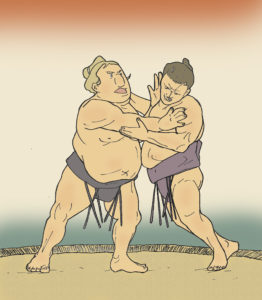Bill Belew has raised 2 bi-cultural kids, now 34 and 30. And he and his wife are now parenting a 3rd, Mia, who is 8.
China has defeated the strategic alliance of Japan, the United States, Australia and India.
The four countries, under the initiative of then Prime Minister Abe of Japan, formed a strategic dialogue to “deepen ties between the democratic nations in the region and prepare for China’s emergence, especially China’s military.”
Singapore chimed in and there was also a joint naval training exercise in the Bay Of Bengal.
Things are different now.
1. Abe is gone. The alliance was his idea.
2. Japan’s new PM Fukuda wants to talk with China.
3. Australia’s Mandarin-speaking PM Rudd has also vowed to improve ties with China, to not provoke the new global powerhouse.
The United States doesn’t get to play naval games anymore.
Japan’s Fukuda was in somewhat of a pickle in that he could not back down because it was his country’s idea from the outset. However, when Australia’s Rudd said they were out, Japan found an escape route.
Meanwhile, India can only hope for improved bilateral talks with anybody.
China meanwhile can glory in a victory over this ‘strategic alliance.’
source


Australia-a natural resource rich country needs the world’s factory to power its economic burgeoning, and a change in the old guard from conservates to liberals marked a significant shift in the strategic thinking especially since chinese military build up be it its army, navy or airforce is ho no way going to affect australian security concerns.
Japan-a export driven consumer market flooder needs a large market to sustain its economy, which china effectively claimed by replacing the US as japan’s largest bi-lateral trading partner. As much a security threat china’s navy poses to japan it would be on its western shores not into the indian oceans depths.
Singapore-still needs to stay ahead of hong kong as a router of goods. So can’t provoke beijing.
US-though still working with india.it regards as a strategic partner. The economic crisis has already forced it to engage with beijing, the nature of the engagement can be underscored by hillary clinton’s recent visit to china and other asian countries, excluding new delhi in the equation.
India-a formal request by beijing was all it took for india to back out of the quadrilateral. The rise of indian economic profile like it or not is coupled with china. So new delhi can’t afford to provoke beijing into aggressive diplomatic manoeuvres. So india has retreated to bilateral exercises.
the economic meltdown has prompted many countries to look at china’s strong financial assets as a good way out of the crisis than a threat to their domestic assets.
In short the quadrilateral is as good as dead, as it lacks strategic depth, political commitment and lack of an action plan. So a true may to contain china would be for the us and india using their good offices in south east asian countries to support each other and build up alliances with them, (vietnam, malaysia, thailand, indonesia, and phillipines) as they would require a natural counter-balance to chinese dominance. But the alliance would require time and trust to build up and the architecture tailored has to be genuine.